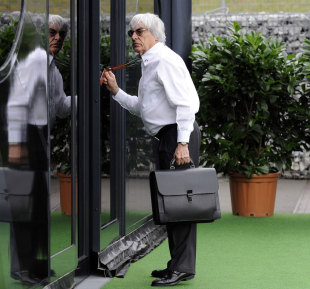

Formula One is in trouble, and while the sport can yet be saved it will take more unity than we have at present to do it.
But if unity cannot be achieved - and the teams have previously demonstrated that cooperation tends to collapse at the altar of competition - then what the sport needs is a truly benign dictator to act on the teams' behalf, prioritising the needs of the many over the single-minded desire to win everything all of the time.
As Bernie Ecclestone has shown time and time again, the teams are very susceptible to divide and conquer tactics. Collective bargaining attempts never last for very long, as teams accept the wisdom of collecting special favours from the commercial rights holder in exchange for their individual cooperation.
What the teams should consider - unpalatable though it may be for those currently in receipt of those special favours - is to entirely abandon any pretence of collective bargaining and instead waive those rights to a sole representative. As Ecclestone has referred to in the past, it is far easier to enforce a single will than it is to rule by committee.
To find a single voice capable of representing the teams as a whole would be challenging, of course. In the short- to medium-term there is the problem of the existing individual memoranda of understanding signed between the teams and the commercial rights holder which are currently sitting in place of a full Concorde Agreement. Those will need to expire before new contracts - ideally a single new contract - can be drawn up.
More importantly, if those currently in possession of favourable deals think that they can maintain their preferential treatment by refusing to disturb the status quo, then it is unlikely they are going to want to do anything that could lose them their advantage.
But that doesn't mean that the have-nots can't find strength in linking together. Toro Rosso may be unwilling to participate in any arrangements that will not be looked upon unfavourably by Red Bull, but Lotus are not going to be sitting on the F1 Strategy Group forever. Even as teams like Sauber and Force India take their turn among the privileged few in forthcoming years, the racers with temporary regulatory input will feel the pinch from their lack of cash prizes given by right to the permanent members of the Strategy Group.
If the weaker teams can bring the FOTA banner back to Formula One they should be able to engineer a situation whereby a nominated chairman - preferably a trained legal brain well versed in contract law - can negotiate on behalf of the group as whole, four (or five) voices making a greater impact by speaking in unison.
The biggest weakness in the scheme that I can see? That the commercial rights holder will use the opportunity to bring in customer cars, telling the united small teams that they can race on his terms or not at all whenever a sticking point in the negotiations is found. It's a pretty big weakness…
